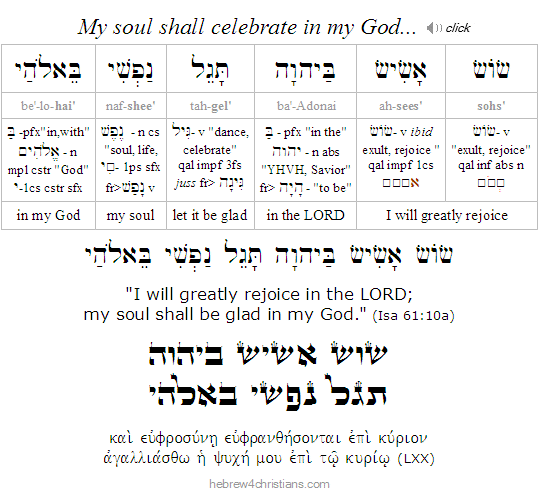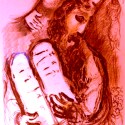|
The haftarah for parashat Nitzavim (i.e., Isa. 61:10-63:9) is the last of the seven readings from the prophets that are consecutively read before Rosh Hashanah. These "haftarot of comfort" foretell of the restoration of the Jewish people and of the coming of the Messianic Era. In this week's reading, the future salvation of the nation of Israel is described. The LORD promises to shine His glorious light upon the Jewish people and to reveal His glory, despite the hour of darkness and tribulation that comes upon the earth.
 |
This beautiful portion sounds the note of rapturous exultation regarding the restoration of Israel after their long exile. Just as a seed must "fall to the ground and die" (John 12:24) in order to become reconstituted into newness of life, so will Israel, after having been nearly destroyed in the Great Tribulation, return to life when they receive their King in the days of His glorious kingdom.
"For Zion's Sake, I will not keep silent..." Zion (or Jerusalem) is central to the Jewish heart since it is the focal point of God's redemptive plan for humanity. God began the creation of the universe there, and the very dust of Mt. Moriah is said to have been used to create Adam (who was later placed in the "garden which lay to the East"). Indeed, it was in Jerusalem that Abraham met with Malkhi-Tzedek (Gen 14:18; Heb 7:1) and afterward offered Isaac upon Mt. Moriah (Gen 22:1-19). King David made Jerusalem the capital of Israel (2 Sam 24:18-25), and the First Temple was built there (1 Kings 6-8; 2 Chron 3:1-2). Zerubbabel and Nehemiah built the Second Temple in Jerusalem (Neh 4-6) which King Herod later remodeled. And of course by means of His crucifixion, burial, and resurrection from the dead, the Messiah performed His sacrificial work in Jerusalem.
Before the great celebration occurs, however, there is the ominous vision of the LORD judging the nations during the time of the Great Tribulation. After this, paradise is restored, and Jerusalem is made the praise of all the earth. This is the climax of Jewish redemptive history, when "all Israel will be saved."
The Haftarah ends with a wonderful verse that reveals God's empathy for the suffering of His people Israel, whom He saved by the "Angel of His Presence" and redeemed in love and compassion:
בְּכָל־צָרָתָם לוֹ צָר
וּמַלְאַךְ פָּנָיו הוֹשִׁיעָם
בְּאַהֲבָתוֹ וּבְחֶמְלָתוֹ הוּא גְאָלָם
וַיְנַטְּלֵם וַיְנַשְּׂאֵם כָּל־יְמֵי עוֹלָם
be·khol · tza·ra·tam · lo · tzar
oo-mal-akh · pa-nav · ho-shee-am
be-a-ha-va-to · oov-chem-la-to · hoo · ge-a-lam
vai-na-te-leim · vei-na-se-am · kol-ye-mei · o-lam

"In all their affliction he was afflicted,
and the Angel of his Presence saved them;
in his love and in his pity he redeemed them;
he lifted them up and carried them all the days of old."
(Isa. 63:9)
|



![Deut 29:9[10h] (BHS)](../../../../Scripture/Parashah/deut29-10-analysis.gif)

